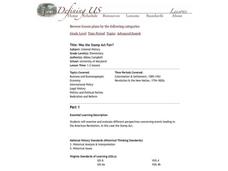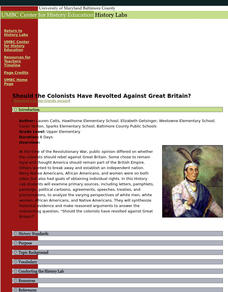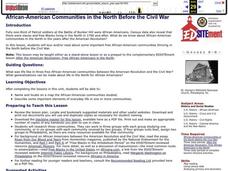Library of Congress
Industrial Revolution
Could you live without your phone? What about cars, steel, or clothing? Class groups collaborate to produce presentations that argue that either the telephone, the gramophone, the automobile, the textile industry, or the steel industry...
Curated OER
Was the Stamp Act Fair?
Elementary and middle schoolers examine and evaluate different perspectives concerning events leading to the American Revolution. In this case, they hone in on the Stamp Act. They research controversial bills, laws, or events of the time...
Curated OER
We The People: A History
Students play a game about taxation where they have tax collectors that simulate the feelings and reasons that led to the American Revolution. In this taxation lesson plan, students learn about why the people in the colonies were so...
National Park Service
The Power of Remembrance
On every July 4th, we watch fireworks and celebrate our independence, but how is the history of the American Revolution preserved? Four social studies lesson guide learners through different memorials, commemorative objects, and restored...
Elizabeth Murray Project
Colonial Women During the Revolution
Young researchers use the Internet or books to find out about colonial women during the American Revolution. They organize information in a graphic to demonstrate their understanding of the research they gathered before writing a...
Jamestown-Yorktown Foundation
Making a Patriot Inquiry: Are Independence, Freedom, and Liberty the Same Thing?
As part of a study of the American Revolution, class members engage in an inquiry-based lesson that has them watch a scene from the play Slave Spy, examine multiple primary source documents, and then discuss the similarities and...
Curated OER
Lesson: Allison Smith: What Are You Fighting For?
Trench art is a nontraditional art form created by soldiers in trenches during wartime. Artist Allison Smith connects her art to the American Revolution and the question: "What are you fighting for?" Kids examine her art, how it connects...
Pulitzer Center
Revolution in Tunisia
How much do your pupils really know about the revolution in Tunisia? In order to inform your class and spark discussion, first create a country profile, comparing and contrasting Tunisia with the United States. Learners then analyze the...
Jamestown-Yorktown Foundation
What Was Everyday Life like in Colonial Virginia?
After reflecting on jobs people perform in the present day, scholars discuss what they believe jobs would have been like in Colonial Virginia during the American Revolution. Small groups then perform a jigsaw using informational packets....
Curated OER
Past Imperfect: Examining Secondary Sources of the American Revolution
Ninth graders respond in essay form to the following writing prompt. Mel Gibson, star of The Patriot, is quoted as stating, "If one were to adhere to historical accuracy all the way, you'd probably have the most boring two hours on...
Center for History Education
Should the Colonists Have Revolted Against Great Britain?
Should the Americans have taken the plunge and revolted against Great Britain? Using documents, including the famed Common Sense and a Loyalist response, pupils conduct a lengthy investigation of the question. The interesting resource...
Curated OER
African-American Communities in the North Before the Civil War
Students examine what life was like in free African-American communities before the Civil War. They analyze maps, identify elements of everyday life in these communities, explore various websites, and complete a chart.
Jamestown-Yorktown Foundation
How Did Relations between Britain and the Colonies Change after the French and Indian War?
What does the French and Indian War have to do with the American Revolution? Following the war, Britain issued the Proclamation of 1763 in an attempt to limit the colonists' western expansion. To understand how the proclamation, the...
Center for History Education
How Did the Public View Women’s Contributions to the Revolutionary War Effort?
Calling upon the legacies of Joan of Arc, Elizabeth I, and Catherine the Great, Esther Reed rallied Southern women to support the American Revolution. Using a broadside by Reed and other primary sources, such as poetry, young historians...
Curated OER
AIH-16: Effect of Revolutionary War on American Indians
Young scholars examine how American Indian cultures changed as a result of the Revolutionary War.
Curated OER
Was There an Industrial Revolution? Americans at Work Before the Civil War
High schoolers investigate the First U.S. Industrial Revolution. They identify positive and negative effects of early industrialization, read first-hand accounts, role-play and interview individuals, and participate in a debate.
Center for History Education
Who Fired the Shot Heard Round the World?
Take a closer look. Young academics become detectives in an engaging lesson plan on the American Revolution. Scholars work in groups to analyze documents to uncover whether the American colonists or British soldiers fired the first shot...
Curated OER
The DIY: A Hands-On Look at the New Industrial Revolution
Upper graders explore the new industrial revolution and how the tech boom in recent years is similar and different to the Industrial Revolution of the past. They watch a video, explore web sites, and discuss what they see. They work...
Benjamin Franklin Tercentenary
Join, or Die: Reenacting the Albany Conference
The Albany Congress was one of the first attempts at colonial unity. While it was an effort against the French during the French and Indian War, it was one of the events leading up to the American Revolution. Scholars consider the...
PBS
Thomas Paine: Writer and Revolutionary
Is the pen really mightier than the sword? Scholars analyze the impact Thomas Paine's book Common Sense had on the American Revolution. Video clips and primary sources investigate the role Paine had on dissent in the colonies. They...
Curated OER
Differing Expectations
Students examine the expectations that colonists had for lives prior to the revolution. In this colonial America lesson, students read primary documents that feature the perceptions of white men and minorities during the time period....
Syracuse University
American Industrial Revolution
While the Industrial Revolution may have fueled America's rise to the top of world markets, the child laborers often faced dangerous conditions. Using primary source images and other information, scholars consider what these children...
Curated OER
The Boston Tea Party: Costume Optional?
Students investigate the events of the Boston Tea Party. They read and analyze first-hand accounts, answer discussion questions, develop a chart of facts, and create a newspaper article, letter, or factual report.
Smithsonian Institution
Who's in Camp?
Pupils complete readings, a group activity using cards, and a writing activity to better understand people's lives during the American Revolution. The resource emphasizes people such as the militiamen, women, officers, and children,...
Other popular searches
- American Revolutionary War
- American Revolution Causes
- American Revolution Projects
- The American Revolution
- American Revolution Battles
- Mind Map American Revolution
- Road to American Revolution
- American Revolution Women
- American Revolutionary Figures
- American Revolution Music
- Causes of American Revolution
- Latin American Revolutions

























